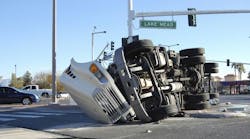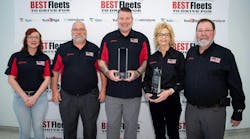Truck driver Robert Palm knows what it's like to be on the road, away from friends and family when a medical emergency strikes. The 35-year highway veteran was severely injured in a crash in 1997. He was hospitalized again in 2010, far from his home, with a ruptured appendix.
Palm prefers not to talk about these mishaps, or himself, but it did spur him in 2014 to start truckersfinalmile.org, a non-profit charity that helps truckers stranded, alone, in hospitals because of medical emergencies. When the worst happens his group helps families bring home the bodies. Sadly, that service is the most requested.
How many truckers die away from home? The Federal Motor Carrier Safety Administration says that almost 850 truckers are killed annually in crashes. "They do not account for the heart attacks, strokes, and suicides, murders, things like that in their statistics," said Palm. He estimates the number of deaths and medical emergencies on the road could be three to four thousand annually. Obviously, he said, that's because most drivers are one the road most of their lives.
The group offers several programs for helping drivers and their families (For example, should a driver need emergency surgery while on the road, one particular program would allow a family member to stay nearby.) but by far the most demand is bringing a driver's body home.
"It is very costly for a family to do that,” Palm noted. “Our typical average can be anywhere from $1,800 to $3,000 depending on location. We’ve had cases as low as $750 and others that were over $4,000.We cap our service at $5,000 unless there’s an extraordinary circumstance."
The group relies on donations and this year will break the $50,000 mark. Palm said that the group has no paid staff – it's all volunteers including the board of directors – and runs on zero reserves. Often, that means they must raise money for a particular driver after the incident; what comes in, goes directly out.
"There’s no wages, no building, there’s no overhead of that sort,” Palm explained. “No one gets a bonus or a salary or anything else like that. Last year, I put $14,000 into this that I won’t recover."
About 92 percent of what comes in is spent on drivers and their families. Sometimes it’s a little lower depending on the month, Palm noted, who is based in Albuquerque. "We’re only in our fourth year, and this year we’ve assisted with 31 cases thus far. Last year, 37. The year before, our second year, it was 17, and our first year was nine. As awareness grows about our organization, we’re getting more demand."
(Detailed operating expenses will be publicly available through IRS form 990 which all non-profit charities must file once they top $50,000 in revenue. Currently, truckersfinalmile.org files a shortened postcard version which contains little detail.)
"Obviously, folks got home before we were here,” Palm added. “But a lot of times you’d have to make a deal with the funeral home to wait on an insurance policy to pay out or whatever the case may be, if the company did not help. And a lot of times, an insurance company won’t pay without a death certificate, and there are many times that a certificate could be delayed, because the pathology report didn’t come back, or there wasn’t a proper signature. There are delays, and we try to fill that gap."
High on his to-do list, Palm is seeking sponsors. "With a good sponsor, we could do this more efficiently, effectively, and expeditiously. There are many times where we’re helping families, but they have to wait on us to raise the funds, because we operate with no reserves. If the driver’s body has been released to the medical examiner for instance, and he’s ready to go home, there are some funeral homes that need their money up front. Sometimes it’s up to us to raise the money. Recently, we had a case where the estimate was $3,000 but thankfully the driver’s company stepped in and took care of it. It would have taken us a couple of weeks to raise that money, and it would have put an unnecessary delay on the family who came to us as a resource. If we had a stable sponsor or three, we’d be in really good shape and able to do a lot more."



